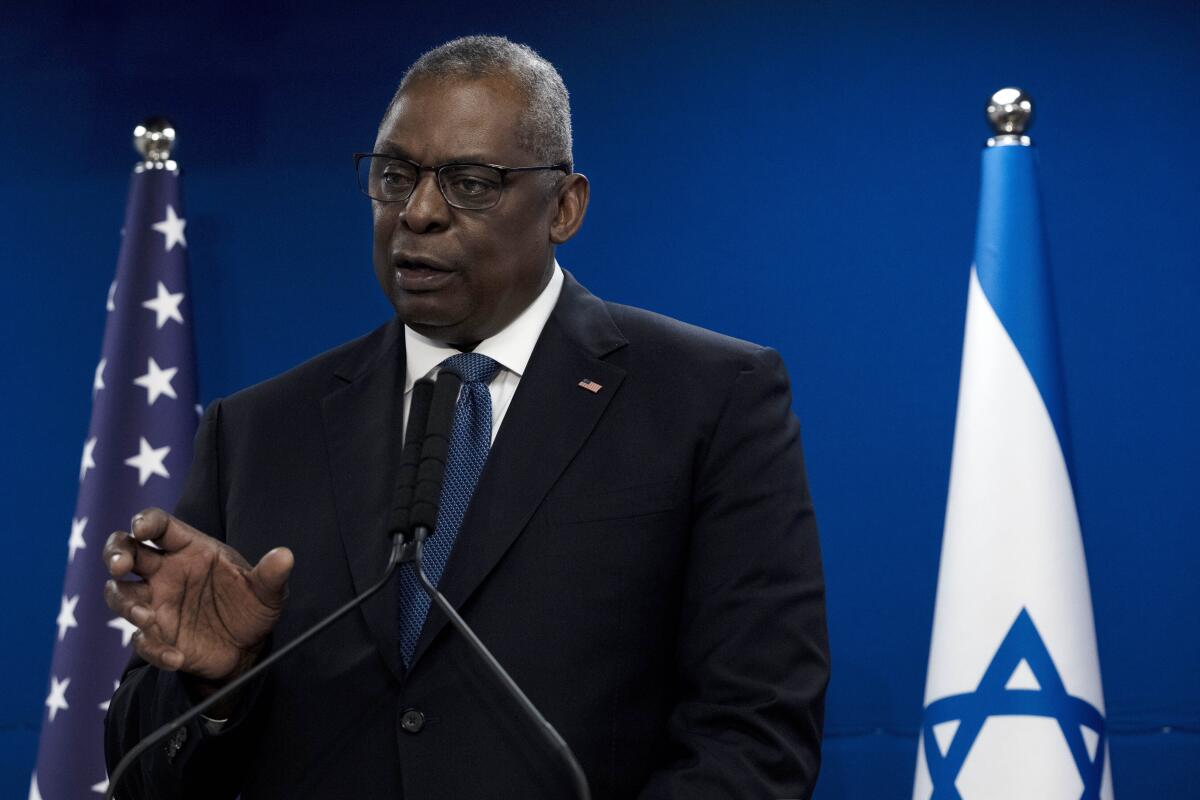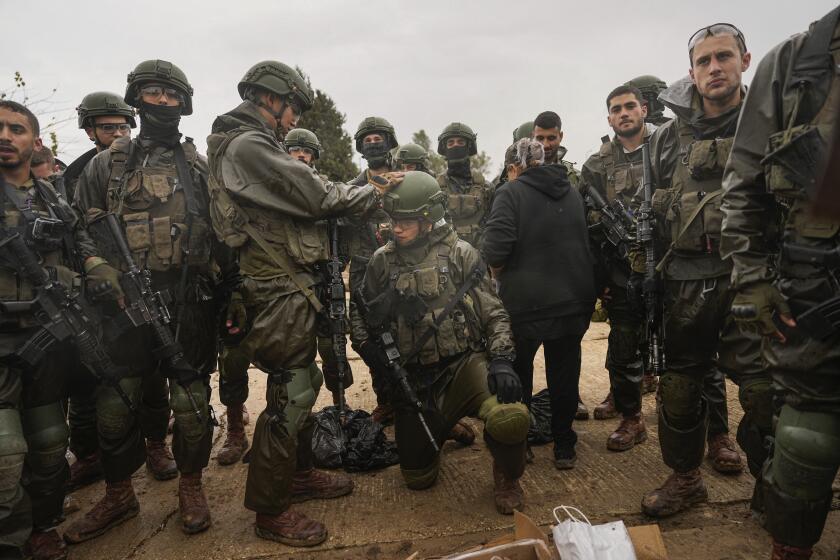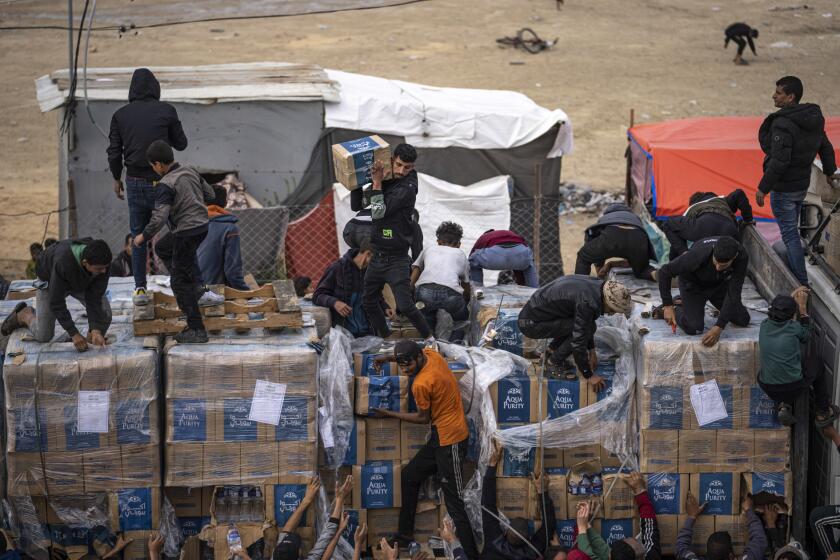Pentagon announces new international mission to counter attacks on commercial vessels in Red Sea

- Share via
MANAMA, Bahrain — The U.S. and a host of other nations are creating a new force to protect ships transiting the Red Sea after attacks by drones and ballistic missiles fired from Houthi-controlled areas of Yemen, Defense Secretary Lloyd J. Austin III announced early Tuesday in Bahrain.
The seriousness of the attacks, several of which have damaged the vessels, has led multiple shipping companies to order their ships to hold in place and not enter the Bab al Mandab strait until the security situation can be addressed.
“This is an international challenge that demands collective action,” Austin said in a statement released just after midnight in Bahrain. “Therefore today I am announcing the establishment of Operation Prosperity Guardian, an important new multinational security initiative.”
The United Kingdom, Bahrain, Canada, France, Italy, Netherlands, Norway, Seychelles and Spain will join the U.S. in the new mission, Austin announced. Some of the countries will conduct joint patrols while others provide intelligence support in the southern Red Sea and the Gulf of Aden.
Several other countries have also agreed to be involved in the operation but prefer not to be publicly named, a Defense official said on condition of anonymity to discuss additional details of the new mission that have not been publicly announced.
The mission will be coordinated by the already existing Combined Task Force 153, which was set up in April 2022 to improve maritime security in the Red Sea, Bab al Mandab and the Gulf of Aden. There have been 39 member nations in CTF 153, but officials were working to determine which of them would participate in this latest effort.
Separately, the United States has called on the United Nations Security Council to take action against the attacks.
In a letter to council members obtained Monday by the Associated Press, U.S. Ambassador Linda Thomas-Greenfield said Houthi attacks targeting commercial vessels legally transiting the international waterways continue to threaten “navigational rights and freedoms, international maritime security, and international commerce.”
The 15 council members discussed the Houthi threat behind closed doors Monday but took no immediate action.
Three U.S. warships — the USS Carney, the USS Stethem and the USS Mason, all Navy destroyers — have been moving through the Bab al Mandab strait daily to help deter and respond to attacks from the Houthis.
The move to set up the expanded operation came after three commercial vessels were struck by missiles fired by Iranian-backed Houthis in Yemen on Dec. 3. Those attacks were part of an escalating campaign of violence that also included armed and other drones launched in the direction of U.S. warships.
To date the U.S. has not struck back at the Iranian-backed Houthis operating in Yemen or targeted any of the militants’ weapons or other sites. On Monday, Austin did not answer a question as to why the Pentagon had not conducted a counterstrike.
After Hamas’ attack, the U.S. pledged full support for Israel. Now, as the death toll in Gaza skyrockets, President Biden is trying to rein in Netanyahu.
The attacks on commercial vessels in the Red Sea had scared off some of the world’s top shipping companies and oil giants, in effect rerouting global trade away from a crucial artery for consumer goods and energy supplies that is expected to trigger delays and rising prices.
BP had said Monday it had “decided to temporarily pause all transits through the Red Sea,” including shipments of oil, liquid natural gas and other energy supplies.
Both oil and European natural gas prices rose partly over market nerves about attacks on container ships and oil tankers passing through a narrow waterway that separates Yemen from East Africa and leads north to the Red Sea and Suez Canal, through which an estimated 10% of the world’s trade passes.
“This is a problem for Europe. It’s a problem for Asia,” said John Stawpert, senior manager of environment and trade for the International Chamber of Shipping, which represents 80% of the world’s commercial fleet. He spoke before the announcement about the international mission.
Depending on what companies decide to do, they would have to add more ships to make up the extra time or burn more fuel for rerouted journeys, said Simon Heaney, senior manager of container research for Drewry, a maritime research consultancy.
Israel’s government is facing calls for a cease-fire from some of its closest European allies as well as protesters at home.
“The impact will be longer transit times, more fuel spent, more ships required, potential disruption and delays — at least in the first arrivals in Europe,” he said.
Stawpert of the shipping chamber said he would expect to see some price increases for consumers in the short term but that it depends how long the security threat lasts. It is unclear how the announcement about the security mission would affect shipping decisions.
Disruptions expected from the Red Sea could have far-reaching effects because they would happen at the same time ships are being restricted through the Panama Canal, a major trade route between Asia and the United States.
Some companies had planned to reroute to the Red Sea — which is a crucial thoroughfare for Asia-Europe shipments — to avoid delays at the Panama Canal caused by a lack of rainfall, analysts say.
“It’s unprecedented that the two have coincided,” analyst Heaney said, adding that neither the Suez nor Panama canals are closed, “it’s just that they’re becoming less viable for the short term.”
Copp reported from Bahrain and Baldor from Washington. Courtney Bonnell contributed to this report from London and Edith M. Lederer from the United Nations.
More to Read
Sign up for Essential California
The most important California stories and recommendations in your inbox every morning.
You may occasionally receive promotional content from the Los Angeles Times.












